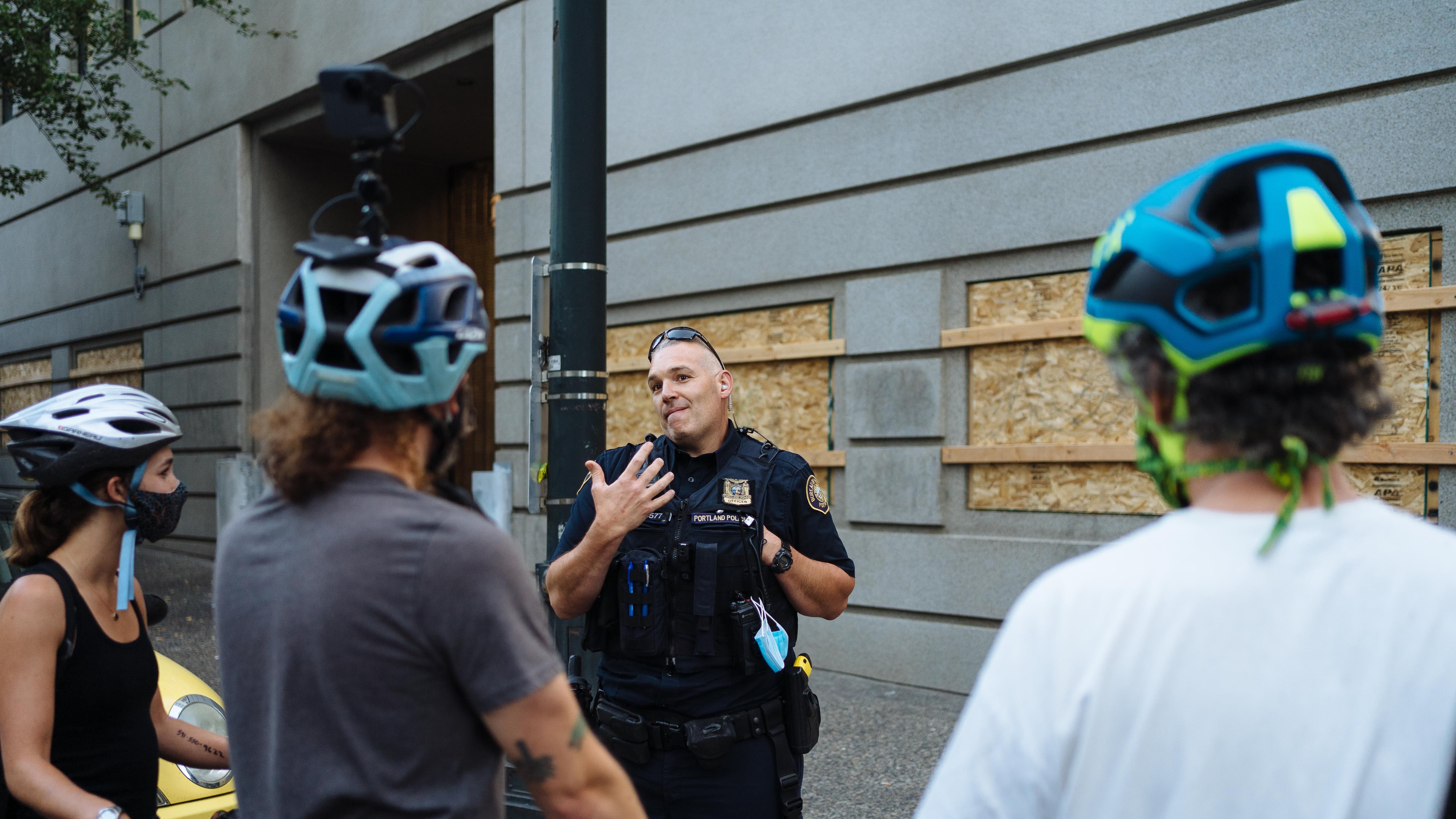On Tuesday night, racial justice protesters visited rookie Commissioner Dan Ryan at his North Portland home, encouraging him to support Commissioner Jo Ann Hardesty's proposal to slash the Portland Police Bureau's budget by $18 million tonight.
For Ryan, who was sworn in last month after a special election to replace the late Commissioner Nick Fish, it was trial by fire. Ryan won an August runoff over former Multnomah County Commissioner Loretta Smith with the help of an endorsement from Hardesty.
But on Wednesday night, Ryan showed that despite pressure from protesters and a passionate plea from Hardesty for his support, he is his own man.
After nearly six hours of testimony Wednesday evening, Ryan in effect cast the deciding vote—to not have a formal vote on Hardesty's proposal, saying he needed more information about the impact the cuts would have on the bureau. He sided with Mayor Ted Wheeler and Commissioner Amanda Fritz in delaying a vote until Nov. 5.
Hardesty did not take the delay happily. She announced at the outset of the hearing she expected a vote on her proposal and repeated that expectation when testimony concluded.
"I see it as a cowardly move to put this vote off until after the election," she said. "I am a bit disgusted at the lack of courage on this council."
With that, Hardesty left the Zoom call that had gone on for six hours as well over 100 people testified, most on her proposed budget adjustment.
The session's testimony leaned overwhelmingly in support of a proposal by Hardesty to cut $18 million from the Police Bureau's budget over the course of the fiscal year that ends June 30, 2021.
Hardesty's proposal came as part of the fall supplemental budget process, more popularly known as the "fall bump." Normally, that process is largely a housekeeping exercise in which the council makes interim adjustments to the budget approved in June.
Mayor Ted Wheeler and Commissioners Chloe Eudaly and Amanda Fritz introduced a number of amendments to the budget, but the real action—and testimony from more than 100 people—concerned Hardesty's proposal to shift $18 million from the PPB budget to a variety of services that would benefit people experiencing houselessness, facing eviction or otherwise suffering from economic distress.
Eudaly, who, like Wheeler, is up for reelection next week, strongly supported Hardesty's proposal.
Wheeler's and Fritz's initial comments suggested they did not support Hardesty's cuts, while Ryan remained quiet.
At the outset, Wheeler announced he needed to leave the hearing at 6 pm for a mayoral debate with his opponent, Sarah Iannarone. That threatened to preclude a vote on Hardesty's proposal, although Hardesty said she wanted a vote even if it meant cutting off public testimony or voting without Wheeler.
A little more than two hours into the hearing, Iannarone testified in favor of Hardesty's cuts—and said she was suspending her participation in the debate Wednesday night so that Wheeler could stay until the end of the public comment period.
Iannarone's concession strengthened the appearance that Hardesty and Eudaly wanted a vote before the election to provide a clear distinction for voters.
That distinction: Eudaly would be well to the left of her opponent, Mingus Mapps, whose campaign has been endorsed and funded by the Portland Police Association. Similarly, the vote would underline that Iannarone, who has pledged that her first step as mayor would be to hand management of the Police Bureau to Hardesty, is well to Wheeler's left.
The discussion foundered on a significant factual question: Eudaly said the $18 million could be cut without laying off any officers.
Wheeler said he didn't think that was accurate and asked that the city's budget director, Jessica Kinard, attempt to verify whether Eudaly's assertion was true while community testimony continued.
In the end, the council never reached closure on that question. "I'm not sure it's accurate that we can cut $18 million without layoffs," Wheeler said in discussion after testimony concluded.
Fritz said she didn't have enough information to vote on the amendments, 15 in all, that her colleagues offered. But she zeroed in on Hardesty's police cuts proposal.
"I was elected to spend taxpayers' money wisely," Fritz said. "I need more information about what is being cut." Fritz also wanted more information about the ways in which the money would be repurposed.
Wheeler agreed.
That put the decision in front of Ryan.
"I don't want to be rushed right now," he said. "I am kind of reflecting on what happened in the U.S. Senate this week. They made a rushed vote on a Supreme Court justice a week before the election. Why would I want to be a part of a government that does that in Portland?"
Ryan's decision tabled the matter until Nov. 5.
Hardesty blasted that position, noting 156 nights of protests. "It is shocking that my City Council colleagues don't know why people are taking to the streets," she said. "I am really disappointed in you, colleagues." Hardesty ended her comments by saying, "I'm done," and left the call.
Wheeler made a peace offering, saying while he wanted more information on the cuts, he agreed with Hardesty and Eudaly that the council needs to put more money into homeless services, violence reduction and support for people who are struggling. "I support the reinvestment," he said. "What is the impact to public safety? That's where my head space is right now."
The split also underlined the shifting nature of council alliances. In June, when the council cut $15 million from the police budget, Hardesty and Wheeler worked closely together. That alliance has withered. Meanwhile, Eudaly, whom Hardesty dismissed after the budget process as a "performative ally" for seeking bigger cuts, is now Hardesty's strongest supporter on the police budget. Fritz is aligned with Wheeler and Ryan, for now, and on this issue, at least, stands with them.

